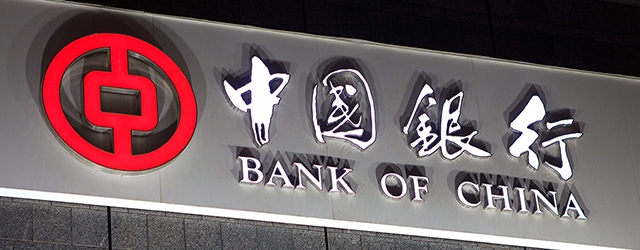For China’s banks, growth is easier than reducing debt and bad loans.

China’s banking sector is dominated by state-owned banks and three “policy banks”—entities established in 1994 to develop policy and finance economic and trade development—that have financed China’s expansion. The government must sustain growth while addressing risks associated with the enormous increase in debt, potential asset bubbles and the shadow-banking market.
The goal of financial reforms outlined by the central bank is to reduce credit without damaging economic growth. However, there has been no meaningful deleveraging of the financial system yet. In fact, the central bank increased lending to banks by 300%, to $1.5 trillion, since 2015. Economic growth waned only slightly, with Q2 2018 growth of 6.7% versus 6.9% in Q2 last year.
The trade war with the US adds additional pressure and may cause more credit expansion. The government has eased collateral and banking reserve requirements, extended loan duration, and provided credit support to local governments and to projects and companies impacted by the trade war. Chinese regulators are also trying to shift shadow banking to the legitimate sector, but the effort conflicts with the mandate to reduce banking-system credit.
The policy banks are aligned with the government and thus were downgraded when S&P trimmed China’s sovereign rating in September 2017. The Agricultural Bank of China was upgraded by Moody’s in May 2018 to A1, giving it a score of 16—par with the other three large state-owned banks that also conduct broad commercial business.
Methodology
The scoring methodology for the Safest Chinese Banks follows that used in our other Safest Banks rankings. A rating of AAA is assigned a score of 10 points, AA+ receives nine points, down to BBB— worth one point and BB+ worth —1 point, and so on. When a bank has only two ratings, an implied score for the third rating is calculated by taking the average of the other two and deducting one point. When a bank has only one rating, an implied score for the second rating is calculated by deducting one point from the actual rating, and an implied score for the third rating is calculated by deducting two points from the actual rating.
|
China’s Top 25 Safest Banks |
|---|
|
Rank |
Company Name |
Fitch |
Moody’s |
S&P |
Total Score |
Assets ($ Mil.) |
Statement Date |
|
|
1 |
China Development Bank |
A+ |
A1 |
A+ |
18 |
2,450,812 |
31-Dec-2017 |
|
|
2 |
Agricultural Development Bank of China |
A+ |
A1 |
A+ |
18 |
808,118 |
31-Dec-2016 |
|
|
3 |
The Export-Import Bank of China |
A+ |
A1 |
A+ |
18 |
479,776 |
31-Dec-2016 |
|
|
4 |
Industrial and Commercial Bank of China |
A |
A1 |
A |
16 |
4,006,242 |
31-Dec-2017 |
|
|
5 |
China Construction Bank |
A |
A1 |
A |
16 |
3,397,688 |
31-Dec-2017 |
|
|
6 |
Agricultural Bank of China |
A |
A1 |
A |
16 |
3,233,212 |
31-Dec-2017 |
|
|
7 |
Bank of China |
A |
A1 |
A |
16 |
2,989,653 |
31-Dec-2017 |
|
|
8 |
Bank of Communications |
A |
A2 |
A— |
14 |
1,388,024 |
31-Dec-2017 |
|
|
9 |
China Merchants Bank |
BBB |
Baa1 |
BBB+ |
8 |
967,141 |
31-Dec-2017 |
|
|
10 |
China CITIC Bank Corporation |
BBB |
Baa2 |
BBB+ |
7 |
871,935 |
31-Dec-2017 |
|
|
11 |
Shanghai Pudong Development Bank |
BBB |
Baa2 |
BBB |
6 |
942,509 |
31-Dec-2017 |
|
|
12 |
China Everbright Bank Company |
BBB |
Baa2 |
NR |
5 |
627,840 |
31-Dec-2017 |
|
|
13 |
Guangzhou Rural Commercial Bank |
NR |
Baa2 |
BBB |
5 |
112,978 |
31-Dec-2017 |
|
|
14 |
Shanghai Rural Commercial Bank |
NR |
NR |
BBB |
3 |
108,707 |
31-Dec-2016 |
|
|
15 |
Ping An Bank |
BB+ |
Baa2 |
NR |
0.5 |
498,875 |
31-Dec-2017 |
|
|
16 |
Bank of Chongqing |
NR |
NR |
BBB— |
0 |
64,649 |
31-Dec-2017 |
|
|
17 |
Industrial Bank |
BB+ |
Baa3 |
NR |
—1 |
985,448 |
31-Dec-2017 |
|
|
18 |
China Minsheng Banking Corp. |
BB+ |
NR |
BBB— |
—1 |
906,396 |
31-Dec-2017 |
|
|
19 |
China Guangfa Bank |
BB+ |
Baa3 |
NR |
-1 |
318,342 |
31-Dec-2017 |
|
|
20 |
Bank of Nanjing |
NR |
Baa3 |
NR |
-2 |
167,099 |
30-June-2017 |
|
|
21 |
Bank of Ningbo |
NR |
Baa3 |
NR |
-2 |
158,483 |
31-Dec-2017 |
|
|
22 |
Xua Xia Bank |
BB+ |
NR |
NR |
-6 |
385,301 |
31-Dec-2017 |
|
|
23 |
Bank of Beijing |
BB+ |
NR |
NR |
-6 |
357,793 |
31-Dec-2017 |
|
|
24 |
China Zhesang Bank |
NR |
Ba1 |
NR |
-6 |
235,988 |
31-Dec-2017 |
|
|
25 |
Bank of Suzhou |
NR |
Ba2 |
NR |
-9 |
37,473 |
31-Dec-2016 |
|
|
Asset figures from Fitch, Moody’s, and company reports. Ratings valid as of Aug. 17, 2018. |
||||||||



